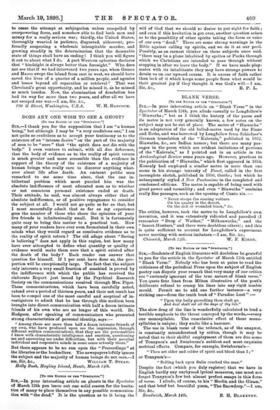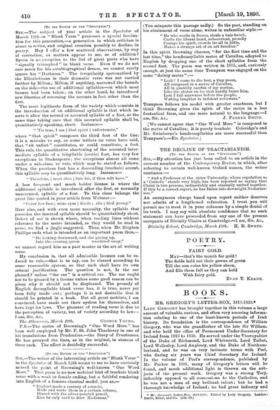BLANK VERSE.
[TO THE EDITOR Or TEl "SPECTATOR."] Sin,—In your interesting article on "Blank Verse" in the Spectator of March 12th, you allude casually to Longfellow's " Hiawatha ; " but as I think the history of the poem and its metre is not very generally known, a few notes on the subject may not be out of place. The metre of "Hiawatha" is an adaptation of the old ballad-metre used by the Finns and Esths, and was borrowed by Longfellow from Schiefner's German translation of the " Kalevala," published in 1852. Hiawatha, &c., are Indian names ; but there are many pas- sages in the poem which are evident imitations of portions of the "Kalevala," as I pointed out in an article in the Arch wological Res iew some years ago. However, previous to the publication of "Hiawatha," which first appeared in 1854, Kenealy had employed a similar metre in more than one scene in his strange travesty of Faust, called in the first incomplete sketch, published in 1850, Goethe ; but which he subsequently styled A New Pantomime in the completed and condensed editions. The metre is capable of being used with great power and versatility ; and even " Hiawatha " contains really fine passages, such as the opening of Canto xix. :— "Never stoops the soaring vulture On his quarry in the desert,
On the sick or wounded bison," &c.
The critics, however, took the metre to be Longfellow's own invention, and it was extensively ridiculed and parodied (I remember "Drop o' Wather," " Milkanwatha," and the "Insect-Hunters," and there were doubtless others); and this is quite sufficient to account for Longfellow's experiment never meeting with serious imitators.—I am, Sir, &c., Chiswick, March 14th. W. F. KIRBY.
170 THE EDITOR OF THE " SPECTATOR:1
SIR,—Students of English literature will doubtless be grateful to you for the article in the Spectator of March 12th entitled "Blank Verse." Nobody who has been at pains to read the criticisms of the periodical Press upon the subject of English poetry can dispute your remark that very many of our critics are "curiously ignorant of the true nature of blank verse." You quote four lines from Milton illustrative of the poet's deliberate refusal to cramp his lines into any rigid iambic mould. Permit me to add one further instance—a very striking one—from the tenth book of "Paradise Lost" :—
"Upon thy belly grovelling thou shalt go And dust shalt eat all the days of thy life."
The slow drag of the line is wonderfully calculated to lend a terrible emphasis to the threat conveyed by the words,—every one monosyllabic. The cumulative effect of these mono- syllables is unique; they smite like a hammer.
The use in blank verse of the tribrach, as of the anapzest, is constantly misunderstood by critics, though it may be noted that to their skilful employment of them are due some of Tennyson's and Swinburne'e subtlest and most exquisite metrical effects. Compare, for example, Swinburne's- " Thou art older and colder of spirit and blood than I ; " or Tennyson's- " Rolling back upon Balm crushed the man."
Despite the fact (which you duly register) that we have in English hardly any unrhymed lyrical measures, one must not forget Tennyson's few but almost perfect essays in this form of verse. I allude, of course, to his "Merlin and the Gleam," and that brief but beautiful poem, "The Snowdrop."—I am, Sir, &c.,
Sandwich, March 14th. E. H. BLAKENEY.
r'ro vas EDITOR OF THE "SPECTATOR.']
12int,—The subject of your article in the Spectator of March 12th on "Blank Verse" possesses a special fascina- tion for this generation,—a. generation in which criticism is about to revive, and original creation possibly to decline, in poetry. May I offer a few scattered observations, by way of correction, as matters appear to me, or of addition ? Byron is no exception to the list of great poets who have "signally triumphed" in blank verse. Even if we do not care much for his autobiographical dream, we cannot surely ignore his "Darkness." The irregularity systematised by the Elizabethans in their dramatic verse was not carried further by Milton; Milton, if anything, narrowed the bounds on the side—the use of additional syllables—on which most license had been taken ; on the other hand, he introduced new liberties of reversing the accents in feet other than the first.
The most legitimate form of the variety which consists in the introduction of an additional syllable is that which in- serts it after the second or accented syllable of a foot, at the same time taking care that this accented syllable shall be, quantitatively speaking, short. Instance- " 'Tis true, I am I that spirit I unfortunate," where "that spirit" composes the third foot of the line; it is a mistake to say, as some writers on verse have said, that " rit unfort" constitutes, or could constitute, a foot. This rule, the quantitative shortening of the accented inter- mediate syllable of a trisyllable (cretic) foot, has very few exceptions in Shakespeare ; the exceptions almost all come under a sub-class, or rule, which may be stated as follows. When the previous foot has a descending (trochaic) accent, this syllable may be quantitatively long. Instance-
" Therefore, I most abso I lute Sir, if thou wilt have."
A less frequent and much bolder license is where the additional syllable is introduced after the first, or normally unaccented, syllable of a foot. To this class belongs the great line quoted in your article from Webster :— " Cover her face; mine eyes I drizzle; she I died young."
Here also, and with even more necessity, the syllable that precedes the inserted syllable should be quantitatively short. Defect of ear is shown where, when reading lines without reference to the metre intended, as they would be read in prose, we find a jingle suggested. Thus, when Mr. Stephen Phillips ends what is intended as an important poem thus,—
" He looking downward, and she gazing up,
Into the evening green wandered away," we cannot regard him as a past master in the art of writing verse.
My conclusion is, that all admissible licenses can be re- duced to rule,—that is to say, can be classed according to some reasonable system, so that each shall have its own critical justification. The question is not, Is the ear pleased ? unless "the ear" is a critical ear. The ear ought not to be pleased by a license unless some good reason can be given why it should not be displeased. The prosody of English decasyllable blank verse has, it is true, never yet been fully made out; perhaps it is not desirable that it should be printed in a book. But all great metrists, I am convinced, have made out their system for themselves, and have kept its laws. The pleasure of reading verse is due to the perception of variety, but of variety according to law.— I am, Sir, &c., The Athenzum, March 12th. GEORGE YOUNG.
P.S.—The metre of Browning's "One Word More" has been well employed by Mr. F. St. John Thackeray in one of his translations from Prudentius,—the Story of Fructuosus. He has grouped the lines, as in the original, in stanzas of three each. The effect is decidedly successful.
[TO THE EDITOR OF THE " SPECTATOR:1
SIR,—The writer of the interesting article on "Blank Verse" in the Spectator of March 12th seems to me to have curiously missed the point of Browning's well-known "One Word More." That poem is no new metrical hint of trochaic blank
verse with a weak or female ending, but a faithful rendering into English of a famous classical model, just as,— "Raphael made a century of sonnets, Made and wrote them in a certain volume, Dinted with the silver-pointed pencil, Else he only used to draw Madonnas." (You misquote this passage sadly.) So the poet, standing on his attainment of verse alone, writes in unfamiliar style:—
" He who works in fresco, steals a hair-brush, Curbs the liberal hand, subservient, proudly Cramps his spirit, crowds its all in little, Makes a strange art of an art familiar."
In this spirit Browning chooses, "for the first time and the last time," the heridecasyllabic metre of Catalina, adapted to English by dropping one of the short syllables from the
second foot. The poem was written in 1855, and, curiously enough, at just the same time Tennyson was engaged on the same "dainty metre" :—
" Look ! I come to the test, a tiny poem, All composed in a metre of Catullus, All in quantity careful of my motion, Like the skates on ice that hardly bears him, Lest I fall unawares before the people, Waking laughter in indolent reviewers."
Tennyson follows his model with greater exactness, but I think Browning gives the spirit of the metre in a less fantastical form, and one more natural to the language.—I am, Sir, &c., J. PARKER SMITH.
[We cannot agree that "One Word More" is composed in the metre of Catalina; it is purely trochaic. Coleridge's and Mr. Swinburne's hendeeasyllabics are more successful than Tennyson's.—En. Spectator.]







































 Previous page
Previous page